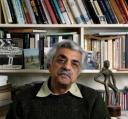Tariq Ali on Creating an Axis of Hope: Latin America and the Middle East
 Tariq Ali addressed a Sydney Ideas audience this week, with a lecture on lessons for the Middle East from Latin America, entitled Latin America and the Arab World: Resistance and Occupation. While one region serves to some degree as a good model of regional autonomy and has broken away from becoming a laboratory of neoliberalism, the other is struggling less successfully, so far, against the designs of neoconservatism.
Tariq Ali addressed a Sydney Ideas audience this week, with a lecture on lessons for the Middle East from Latin America, entitled Latin America and the Arab World: Resistance and Occupation. While one region serves to some degree as a good model of regional autonomy and has broken away from becoming a laboratory of neoliberalism, the other is struggling less successfully, so far, against the designs of neoconservatism.
RT: 1h 36 m, Tariq Ali starts 6 minutes in after short introduction; Q and A follows the initial 50 minute address.

Aaaagh! It cuts off just as someone asks him a really interesting question about the plight of women in Islam being the engine for the kind of social movement we are seeing in Latin America. I’d really have liked to hear that! He was on the verge of describing it Iranian terms, too!
dammit dammit dammit!
It’s so hard to get information about this stuff that one can feel deeply IS reliable… even at least tending to help one’s intuition make positively productive leaps! Setting aside the conscious effort to withhold information here, stultify real quality education, there is a proliferation of biased-to-the-point-of-lying “scholarship” on the history of the Middle East. I know “history” has always been about believing the work most pleasing to the reader in one way or another, but this problem has been exacerbated by what amounts to the imposture of scholarship shamelessly lending itself to political agendas in the modern era.
I remember the problem being identified, by, if I remember correctly, Foucault… and it’s almost as if “scholars” took that as their cue to be more flagrant.
Usually, when there is something I want to understand well, I drag my ass to a good library and grab as many books as I can about it. When I attempted to do this with the Middle East, the Palestine/Israel part especially, I almost burned down the library from my inability to find anything in any two books that corresponded with each other. I had to set about finding out in an entirely different way — comparison of time lines ended up being my access portal.
Academia, and what passes for scholarship in many places, can really set me off. I esteem it almost above all else on the one hand, and feel like vaporizing it on the other.
At any rate, thanks for the lecture, but I really wanted to hear Ali’s answer to that question!
I want to find an audio sharing service that has a vast collection of great lectures so bloggers can be mini-universities for the nearly dumbed-to-death minions!
Tell me about it, 99, both on the scholarship of the Middle East and academe and its corporatisation.
Fortunately there are still pockets of genuine scholarship and service to truth (rather than power) all around the place, and academic freedom does still mean something in many quarters. Our society needs its thinkers a great deal, whether or not they are schooled in academe or not, and there are a good number of thinkers who are not constrained by the institutions of “higher learning”.
I’m a supporter of self-education and think your audio suggestion is a great idea. I have compiled a few ad hoc lectures on my audio page (listen to one of my favourites by Johan Galtung and tell me what you think, I’ll just check that the link is still live) and there’s a couple on the Middle East, too (eg Fisk) which is one of the most ideologically contested areas as you well noted.
On Israel-Palestine, the facts are becoming less contested outside the US now, and Israeli scholarship is ahead of mainstream right-wing US scholarship. With this new consensus emerging, the only difference is that the justification is different. So an Israeli ‘New Historian’ like Benny Morris finally acknowledges the ethnic cleansing perpetrated by the state of Israel early on, but attempts to explain it away or deems it necessary, unlike his more principled and less racist historian colleagues Avi Schlaim and Ilan Pappe.
I’m happy to offer some recommendations on Middle East politics generally or areas more specifically therein if ever interested.
Well the link of Galtung was dead, but I found the mp3 at the bottom of their downloads page, and will listen to it now. If I can get my techno brains on straight, maybe I can upload it to some kind of audio sharing service? Anyway: Ideas Downloads… :-P
Pingback: A Weapon Of Mass Destruction « Complex System Of Pipes
Pingback: Progressive Podcast » Blog Archive » Tariq Ali - Latin America and the Arab World: Resistance and Occupation